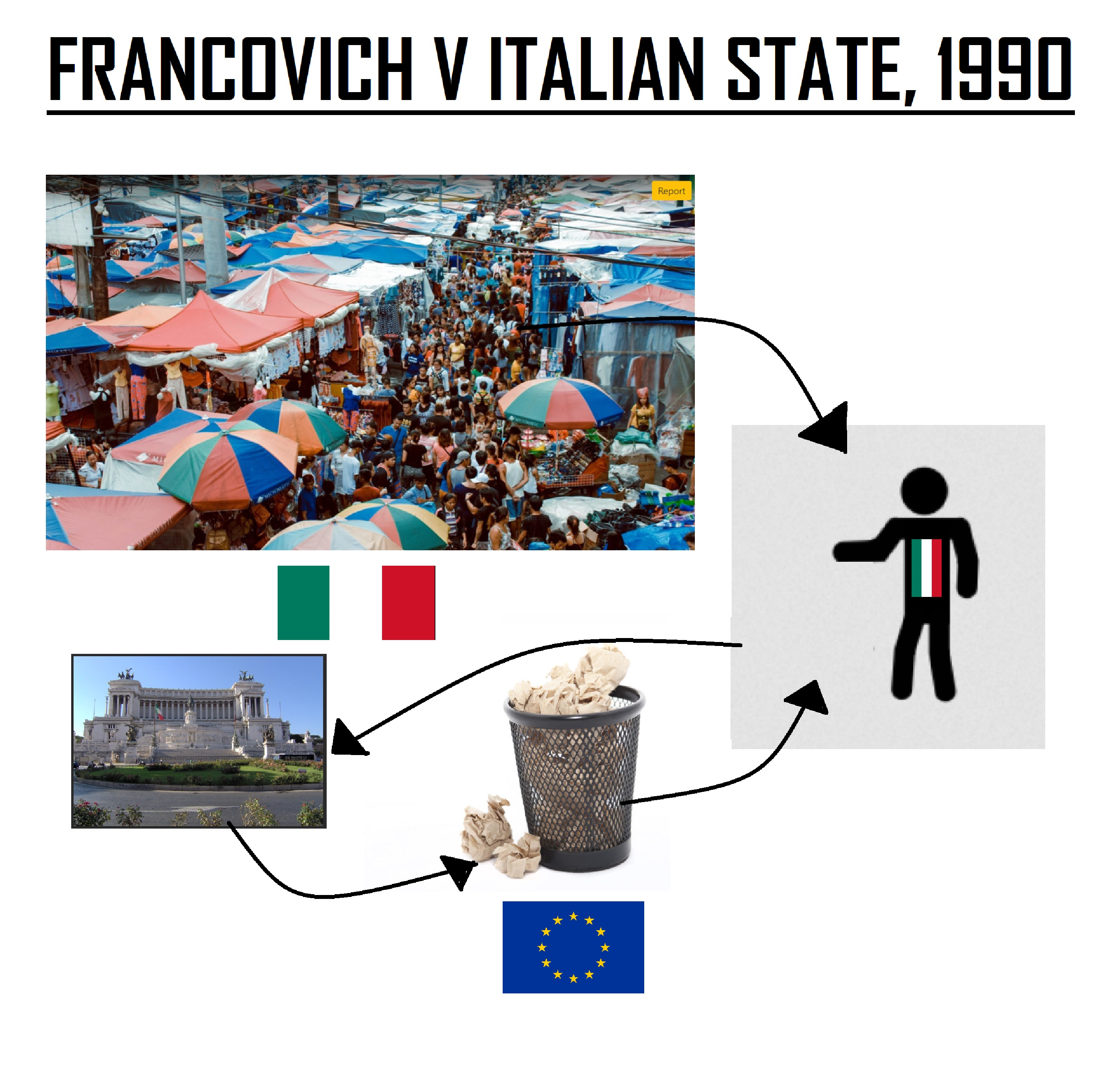Francovich v Italian State, Case 6-9/90, ECJ
Citation: Francovich v Italian State, Case 6-9/90, ECJ
Rule of thumb:What happens if an EU national state refuses to convert an EU directive into law through their national Parliament? This EU law case raised an extremely important point of administrative law. This case affirmed that where a national Government/Parliament deliberately does not convert an EU directive into national law within the time limit they are supposed to, and flagrantly ignores EU law directives, then the national Government can be sued by people caused financial losses by this failure to introduce the directive.
Facts: The facts of this case were that Mr Francovich was employed with a fairly big electricity organisation in Italy. This electrical organisation owed Francovich quite a lot of money in unpaid wages but then they went into insolvency without paying Francovich these wages they owed him. Under an EU insolvency directive of 1980 the electrical company should have had insurance to cover these unpaid wages in the event of insolvency. The EU Insolvency Protection Directive of 1980 stated that EU states had to introduce certain measures of insolvency law so that all organisations employing people had to have a minimum level employee insurance for lost wages in case they went into insolvency. Francovich's company did not have insurance however because the Italian Parliament/Executive had not bother to cover the EU directive into an Italian legislative act. The Italian Government/Parliament had not bothered to introduce this directive into Italian law so Francovich's employer was not forced to get insurance. Francovich wrote to the Italian Government and stated that they should pay him the money he was owed under EU law, but the Italian Government refused to give Francovich any money so Francovich took the matter to Court.
Arguments: Francovich argued that the Italian Government had been so reckless in failing to convert this EU directive into Italian law that the Italian state should be made liable for this. Francovich argued that the Italian Government knew that the time limit to act upon this insolvency directive had expired and quite simply did not care. Francovich argued that the Italian Government continued to let Italian employers employ employees with no compulsory insolvency insurance in place whatsoever to cover them going into insolvency, and did not care if their national laws were in breach of EU law or not. Francovich's position was that the Italian Government were effectively flippantly treating the EU directives as 'voluntary' ignoring this insolvency directive. Italy argued that there were so many EU law directives that states could not be held liable for not introducing them. The Italian Government argued that now it had been brought to their attention, they would introduce it, but they could not be made financially liable for this.
Judgment:
The Court upheld the arguments of Francovich. The Court held that this was a serious and reckless breach of EU law by the Italian Government/Parliament, rather than merely an accident or a mix-up. It was affirmed that countries have to have a system of checking up on new EU Directives that have been passed and introducing them to the Parliament in good time. The Court held that Francovich was entitled to damages for his lost wages from the Italian Government's abdication of their duties in trying to introduce this insolvency directive. The Italian Government lost this case and Francovich won - the Italian Government had to pay up to Francovich for the lost wages he would have obtained if the 1980 EU Insolvency had been converted into Italian law to force his previous employer to get compulsory insolvency insurance.
’31. It should be borne in mind at the outset that the EEC Treaty has created its own legal system, which is integrated into the legal systems of the Member States and which their courts are bound to apply. The subjects of that legal system are not only the Member States but also their nationals. Just as it imposes burdens on individuals, Community law is also intended to give rise to rights which become part of their legal patrimony. Those rights arise not only where they are expressly granted by the Treaty but also by virtue of obligations which the Treaty imposes in a clearly defined manner both on individuals and on the Member States and the Community institutions (see the judgments in Case 26/62 Van Gend en Loos [1963] ECR 1 and Case 6/64 Costa v ENEL [1964] ECR 585). 32. Furthermore, it has been consistently held that the national courts whose task it is to apply the provisions of Community law in areas within their jurisdiction must ensure that those rules take full effect and must protect the rights which they confer on individuals (see in particular the judgments in Case 106/77 Amministrazione delle Finanze dello Stato v Simmenthal [1978] ECR 629, paragraph 16, and Case C-213/89 Factortame [1990] ECR I-2433, paragraph 19). 33. The full effectiveness of Community rules would be impaired and the protection of the rights which they grant would be weakened if individuals were unable to obtain redress when their rights are infringed by a breach of Community law for which a Member State can be held responsible. 34. The possibility of obtaining redress from the Member State is particularly indispensable where, as in this case, the full effectiveness of Community rules is subject to prior action on the part of the State and where, consequently, in the absence of such action, individuals cannot enforce before the national courts the rights conferred upon them by Community law. 35. It follows that the principle whereby a State must be liable for loss and damage caused to individuals as a result of breaches of Community law for which the State can be held responsible is inherent in the system of the Treaty’.
'in the absence of such action (converting directives into national legislative acts), individuals cannot enforce before the national courts right conferred them upon by community law ... a State must be liable for loss and damage caused', ECJ

Warning: This is not professional legal advice. This is not professional legal education advice. Please obtain professional guidance before embarking on any legal course of action. This is just an interpretation of a Judgment by persons of legal insight & varying levels of legal specialism, experience & expertise. Please read the Judgment yourself and form your own interpretation of it with professional assistance.

